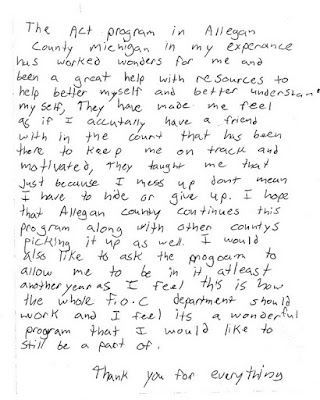By Hon. Margaret Zuzich Bakker, 48th Circuit Court, and Steve Capps; Director, Friend of the Court Bureau
For decades, parents who did not pay their child support were labeled “deadbeats,” which assumed they were deliberately choosing to avoid supporting their children, lacking a sense of responsibility to help raise them. Child support laws made sure these parents were punished accordingly. Today we know that people are more complex and there are many reasons a parent may be unable to pay despite having a desire to pay. This led the 48th Circuit Court (Allegan County) to ask whether there might be a better way to enforce support obligations for the parents who want to pay, but lack the ability.
Michigan has been a pioneer in the drug treatment court movement. There are currently 134 drug treatment courts in Michigan, consisting of 56 hybrid courts (drug/DWI sobriety); 13 adult drug courts, 36 DWI sobriety courts; 12 juvenile drug courts; 8 family dependency courts; and 9 tribal healing-to-wellness courts. Drug Courts and Mental Health Courts are primarily concerned with addressing the crime-related consequences of substance abuse and mental illness.
In 2014, recognizing that specialty court principles could be applied to address issues that resulted in an individual’s inability to pay support, the Friend of the Court Bureau, in consultation with the Friend of the Court Association, sought legislation to establish specialty courts for nonpayment of support cases.
MCL 552.635a established the “Alternative Contempt Track” (ACT) to offer assistance to individuals who have difficulty making support payments due to: a medical condition, psychological disorder, substance use disorder, illiteracy, homelessness, temporary curable condition that the payer has difficulty controlling without assistance, or unemployment lasting longer than 27 weeks. The court develops a case service plan for each participant who can be sanctioned for failure to meet its terms. Each court using an alternative contempt track must submit and obtain approval of its plan by the State Court Administrative Office.
In March 2017, Allegan County submitted the first approved ACT plan and designated one of its friend of the court (FOC) enforcement workers to serve as the ACT case manager who would help ACT participants overcome challenges and remove barriers preventing them from paying their support. By addressing these issues, ACT helps payers break the cycle of being in and out of jail for nonpayment of support.
Here’s one story: Mom hadn’t been paying her child support for years, with a history of bench warrants being issued for failure to appear to show cause hearings dating back to 2002. The Friend of the Court (FOC) made countless attempts to get her into compliance, which were all unsuccessful. Enter Allegan FOC’s ACT program. The ACT program identified that Mom had several barriers to making full payments, including mental health issues and years of being unemployed. After one year of probation in the ACT program, she fully paid off her arrears and completed her Certified Nurse Assistant (CNA) course while maintaining stable employment.
Another participant wrote to us about the program, saying the “…experience has worked wonders for me and been a great help with resources to help better myself and better understand myself.” The participant went on to say the program felt like having an ally in the court keeping them on track and motivated, teaching them that just because you mess up does not mean you have to hide or give up. The participant also expressed a hope for other counties to offer similar programs and asked to personally continue in the program another year.ACT operates as a year-long intensely supervised probationary program which support payers enter voluntarily. Payers who are accepted into the program work with the Specialized Enforcement Officer who will directly assist them in addressing the barriers and challenges they experience.
ACT works with various employment services, substance abuse treatment services, mental health services, educational services, and many other community agencies and resources. Participants are required to meet weekly with the Specialized Enforcement Officer weekly to monitor their progress and monthly with the Presiding Judge. Participants are set up for success, but will face swift sanctions if they fail to comply with the orders of the court regarding their individualized case service plan.
ACT has shown us that after years of using the same enforcement methods unsuccessfully, the new methods we use in ACT can change failure to success. While not every payer needs ACT, having it available for those who do means not only successfully collecting child support in more cases, but also empowering struggling parents to re-collect their lives.
The Honorable Margaret Zuzich Bakker has been the Chief Judge of the Allegan County Circuit Court since her election to the bench in January 2011. Judge Bakker graduated from the Detroit College of Law in 1979, after graduating from Michigan State University. As an assistant prosecuting attorney and chief assistant prosecuting attorney for Allegan County starting in 1982, she specialized in litigation, focusing on crimes involving sexual assault, child abuse and neglect and other violent crimes. Judge Bakker is a founding member of Sylvia’s Place, Allegan County’s non-profit organization that addresses issues of interpersonal violence, and is also a founding member of the Allegan County Legal Assistance Center and serves on the Board of Directors. Judge Bakker also served as president of the Board of the Center for Women in Transition (now Resilience), Safe Harbor Children’s Advocacy Center, Wings of Hope Hospice and Disability Network/Lakeshore. Judge Bakker was the first female assistant prosecuting attorney appointed in Allegan County, and the first female Circuit Court judge in Allegan County. She currently chairs the Rules Committee for the Michigan Judges Association and is appointed to the Justice for All Commission.
Steve Capps is director of the Friend of the Court Bureau. His staff is the primary source of management support for Michigan's friend of the court offices and family division courts and advises the Michigan Supreme Court and its staff regarding state and federal statutes and regulations that affect family law issues. Before coming to SCAO, Mr. Capps served as a friend of the court for Branch County and as a referee and a domestic relations mediator for the circuit courts in Calhoun and Branch counties. A past president of the Branch County Bar Association, he currently serves as a member of the program leadership group for Michigan's child support program.



